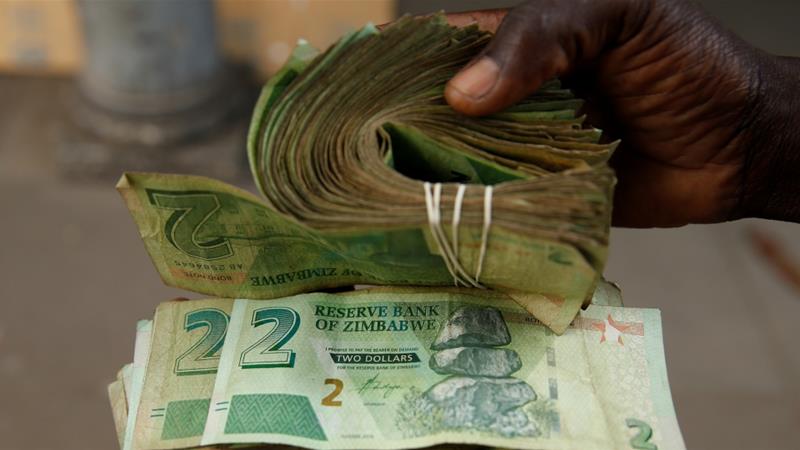REPORT WITH US
WhatsApp: +263 7 18636459
Email: editor@thecitizenbulletin.com
Twitter: @TheCB_News
Facebook: The Citizen Bulletin
“More Local, More Inclusive, More Interactive"

Central government's pledges to rehabilitate local hospitals such as Manama (pictured) have remained largely unfulfill...
Continue Reading...
A street vendor displays bond notes, Zimbabwe's pseudo-currency which has led to hyper-inflation. Photo by Philimon Bulawayo/Reuters
by Dumisani Nyoni
MATABELELAND SOUTH, April 7. 2020 (The Citizen Bulletin) — Small to Medium Enterprises (SMEs) in Matabeleland South are already counting their losses resulting from Zimbabwe's lockdown aimed at taming the spread of the coronavirus.
After having survived the impact of the 2008 record breaking hyperinflation outside a war zone, the SMEs are facing a bleak future emanating from the COVID-19 health crisis which could further hurt Zimbabwe's nose-bleeding economy.
A cocktail of measures announced by the national government to halt the spread of the coronavirus has had a telling impact on SMEs, Beitbridge Business Association (BBA) coordinator Clevers Moyo told The Citizen Bulletin.
Moyo, who runs a book shop in Beitbridge, said on average, he makes between ZAR2000 and ZAR3000 a day, a near ZAR60 000 loss in potential revenue during the 21-day lockdown.
“If we really care about SMEs as a country, the (central) government should do something. After 21 days it will be difficult for some of the businesses to reopen. We don’t even know where to start. Our future is bleak,” he said.
“After the lockdown, we wonder whether we are going to be able to reopen again.”
As part of a cocktail of lockdown measures to fight the spread of the coronavirus, President Emmerson Mnangagwa’s administration announced the closure of all businesses that offer non-essential services, SMEs included.
But the measures are hurting the SMEs who have become the country’s major economic driver in the face of a comatose economy and an unstable political environment.
The SMEs are credited for creating employment for more than 70% of the working population in Zimbabwe and 95% across the globe, recent studies show.
According to the World Bank, there are more than 2,8 million SMEs in Zimbabwe with more than 3,7 million businesses.
“We are doomed. South Africa is our major supplier in terms of goods and with the outbreak of this disease (COVID-19) and enforced lockdowns, it spells closure for our businesses,” Nombulelo Zondo who runs a boutique in Gwanda centre, said.
ALSO READ: How Zimbabwe's False Start Derailed COVID-19 Fight
As a solution to assist SMEs, the BBA coordinator pleaded with the government to set up a fund to cushion informal and small-scale enterprises that have not been spared by the global pandemic.
“We appeal to the government to chip in by availing funds to assist SMEs restock like what the South African government has done,” Moyo said.
“That will go a long way to save jobs. If the government doesn’t chip in, it will take us the whole of 2020 to restart again. I don’t want to lie to you; some businesses will not re-open,” he added.
In neighbouring South Africa, that country’s government, with the help of R2 billion donated by the Oppenheimer and Rupert families, has availed a fund to assist small businesses back to their feet.
In Zimbabwe, the government plans to create a similar fund, with seeding of a ZW$600 million cushioning package for SMEs to compensate for loss of income during the 21-day national lockdown.
Women Affairs, Small and Medium Enterprises minister Sithembiso Nyoni was evasive when asked to confirm when the central government will release the cushioning funding to the SMEs, preferring to only say “we have asked their representative organisations to submit a list of their requirements to the ministry.”
In the interim, SMEs pleaded with the government to ease business restrictions to allow them to operate during the nationwide lockdown to save them from total collapse.
“We appeal to the government to allow us to operate, say for three hours a day, so that we save our businesses from total collapse,” Hadzisami Ndlovu, a SMEs trader based in Plumtree said.
According to a 2018 International Monetary Fund (IMF) working paper titled: Shadow Economies Around the World: What Did We Learn Over the Last 20 Years?, Zimbabwe has the second largest informal economy as a percentage of its total economy in the world at 60,6%.
As of April 7, Zimbabwe had ten confirmed COVID-19 cases and one death, according to government authorities.
This website uses cookies that are necessary to its functioning and required to achieve the purposes illustrated in the privacy policy. By accepting this OR scrolling this page OR continuing to browse, you agree to our privacy policy.